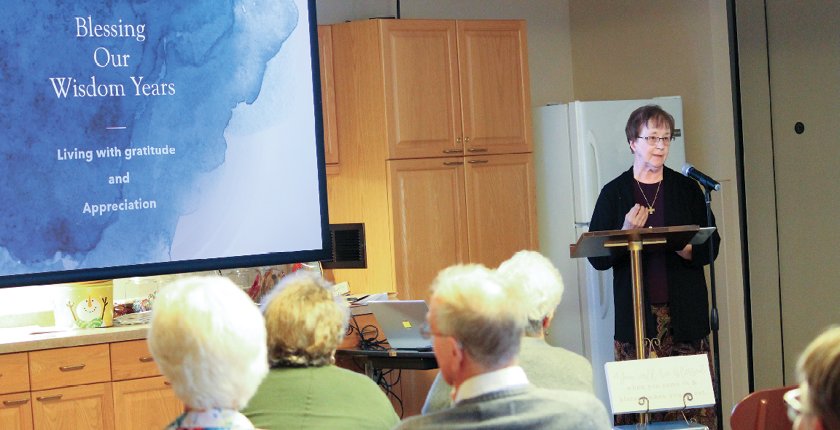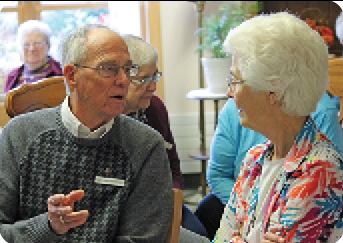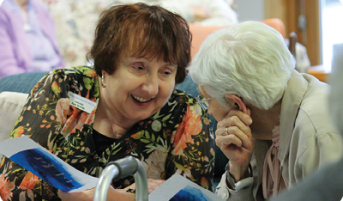
During her presentation to Sisters and Associates, Sister Jane Riha says the blessing of others is as simple as seeing them and delighting in that encounter. (Renae Bauer photo)
Biblical stories provide beautiful examples
by Renae Bauer
Retirement comes, your children are grown and maybe you have downsized from the house in which you raised your family. Welcome to the Wisdom Years, a time to reflect on your life experiences and to share them with others.
The Wisdom Years are full of opportunities, says Sister Jane Riha, who has been so drawn to living fully the third stage of life that she completed a two-year program offered by the Oblate School of Theology. Now, she shares her knowledge with Sisters and Associates, most recently at the Oct. 14 presentation titled, “Blessing Our Wisdom Years.”
In addition to the Church’s many blessings and prayers, a person can bless someone else simply by “truly seeing another person, such as an older person seeing a younger person and delighting in that person,” says Sister Jane. But before a person blesses others, he or she should prepare. Part of the capacity to bless others is to recognize God delights in us. Sister Jane suggests practicing some self-reflection and allowing old wounds to heal. “There still may be some interior growing that needs to happen,” she adds.
A blessing itself can be a prayer but it can also be a matter of speaking well of others and delighting in the presence of another, says Sister Jane. Sacred Scripture provides many beautiful examples, of which Sister Jane shared four:
- The baptism of Jesus when a voice from heaven proclaims, “You are my beloved Son; with you I am well pleased.” (Lk. 3:22)
- When Mary visits Elizabeth, each woman blesses the other. Mary blesses Elizabeth by making the journey, and Elizabeth blesses Mary by proclaiming, “Most blessed are you among women, and blessed is the fruit of your womb.” (Lk. 1:42) Sister Jane adds: “There is utter love and compassion in their relationship as they are present to one another.”
- The story of mother-in-law Naomi and daughter-in-law Ruth who are immigrants weathering the loss of Naomi’s husband and sons. Naomi insists that Ruth return home but Ruth replies: “Wherever you go I will go, wherever you live I will live. Your people shall be my people, and your God, my God. Wherever you die I will die, and there be buried.” (Ru. 1:16) Sister Jane says: “they are blessing each other through their self-sacrificing love.”
- The story of the Prodigal Son in which the son squanders his inheritance and returns to his father asking for forgiveness. Scripture reads, “While he was a long way off, his father saw him and was moved with pity. He ran to the boy, clasped him in his arms and kissed him tenderly.” (Lk. 15:20-21) “The father had to be full of forgiveness,” observes Sister Jane, adding that “blessing others includes forgiveness.”
We bless others when we acknowledge their presence, enter into their joy, wish them well, give them our undivided attention, and sacrifice our own lives so that someone else can have a more productive and peaceful life.
“What I wanted to convey is that not all blessing is easy to do,” says Sister Jane. “Blessing flows from the inner light within your heart. To be aware of how, when, who I bless or are open to bless comes from this inner source.”

